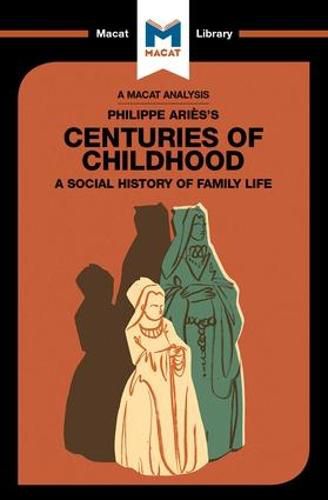Readings Newsletter
Become a Readings Member to make your shopping experience even easier.
Sign in or sign up for free!
You’re not far away from qualifying for FREE standard shipping within Australia
You’ve qualified for FREE standard shipping within Australia
The cart is loading…






A critical analysis of Centuries of Childhood, in which the French historian Philippe Aries offers a fundamentally fresh interpretation of what childhood is and what the institution means for society at large. Aries’s core idea is that ‘childhood,’ as we understand it today - a special time that requires special efforts and resources - is an invention of the 19th century, and that before that date children were in effect thought of as small adults. This led him to a re-evaluation of sources that suggested a second, crucial, conclusion: the idea that these competing visions of childhood were the products of two very different conceptions of human society.
An earlier, essentially communal, social ideal, Aries wrote, had been supplanted by a society far more family-centric and hence inward-facing. In his view, moreover, this increased focus on childhood posed a direct challenge to a well-entrenched social order. ‘One is tempted to conclude,’ he wrote, ‘that sociability and the concept of the family were incompatible, and could develop only at each other’s expense.’
This revolutionary thesis, which has inspired and infuriated other historians in roughly equal measure, was made possible by Aries’s determination to understand the meaning of the evidence available to him and highlight problems of definition that others had simply glossed over, making Centuries of Childhood an important example of the critical thinking skill of interpretation.
$9.00 standard shipping within Australia
FREE standard shipping within Australia for orders over $100.00
Express & International shipping calculated at checkout
A critical analysis of Centuries of Childhood, in which the French historian Philippe Aries offers a fundamentally fresh interpretation of what childhood is and what the institution means for society at large. Aries’s core idea is that ‘childhood,’ as we understand it today - a special time that requires special efforts and resources - is an invention of the 19th century, and that before that date children were in effect thought of as small adults. This led him to a re-evaluation of sources that suggested a second, crucial, conclusion: the idea that these competing visions of childhood were the products of two very different conceptions of human society.
An earlier, essentially communal, social ideal, Aries wrote, had been supplanted by a society far more family-centric and hence inward-facing. In his view, moreover, this increased focus on childhood posed a direct challenge to a well-entrenched social order. ‘One is tempted to conclude,’ he wrote, ‘that sociability and the concept of the family were incompatible, and could develop only at each other’s expense.’
This revolutionary thesis, which has inspired and infuriated other historians in roughly equal measure, was made possible by Aries’s determination to understand the meaning of the evidence available to him and highlight problems of definition that others had simply glossed over, making Centuries of Childhood an important example of the critical thinking skill of interpretation.